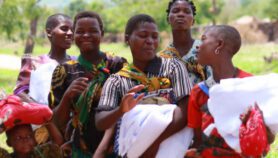By: Nicky Lewis
Send to a friend
The details you provide on this page will not be used to send unsolicited email, and will not be sold to a 3rd party. See privacy policy.
The controversial ‘gp120’ AIDS vaccine has failed to prevent HIV infection in human trials in the United States and Europe, according to preliminary results released today. US company VaxGen announced that HIV infection was reduced by only 3.8 per cent in the test group — not statistically different from those taking a placebo.
In a surprising twist, however, the vaccine was found to offer significant protection to certain groups, cutting HIV infections by two-thirds or more in black and Asian trial participants.
VaxGen acknowledges that the number of participants in these ‘ethnic minority’ groups were small compared to the entire study sample — which numbered more than 5,000 — but says that it is extremely unlikely that these results occurred purely by chance.
“This is the first time we have specific numbers to suggest that a vaccine has prevented HIV infection in humans,” said Philip Berman, VaxGen’s senior vice president of research and development, and inventor of the vaccine.
The overall results were described as “disappointing” by Seth Berkley, head of the US-based International AIDS Vaccine Initiative (IAVI). Nevertheless, he added that the search for an AIDS vaccine will — and must — go on.
“A vaccine is the world’s best hope to end the spread of a virus that infects nearly 15,000 men, women and children daily and threatens the survival of whole communities,” Berkley said in a statement.
If the trials had proved successful, the vaccine, known as AIDSVAX, would have been the first AIDS vaccine to pass Phase III of clinical testing — the last stage before companies can seek approval to market new drugs. But VaxGen appears to be undeterred by the mixed results.
“We intend to continue development of this vaccine… including additional studies as necessary, for use in groups in which the vaccine demonstrated a significant reduction in infection,” said Lance K. Gordon, chief executive officer of VaxGen. “In parallel, we will continue our work on the vaccine to make it more broadly effective.”
Peter Piot, executive director of UNAIDS, backs up Gordon’s optimism, saying that the results are “promising” and that the trial “provides clear evidence that a vaccine can work”.
Referring to the fact that AIDSVAX only targets subtype B of the virus — which is mostly found in North America and Europe — Berkley said it was important for the world to prioritise AIDS vaccine research “that is tailored for the developing countries that are hardest hit by the epidemic”.
VaxGen is also investigating vaccines that target subtypes prevalent in Africa and Asia. Results from Phase III trials of a formulation designed to protect against subtypes B and E — currently being conducted in Thailand — are expected later this year.
But the company has already been strongly criticised for pursuing a vaccine that only targets antibodies, and not other elements of the immune system. Today’s results will only reinforce scepticism about its strategy.
© SciDev.Net 2003
Related external links:
VaxGen
IAVI statement
WHO/UNAIDS statement













